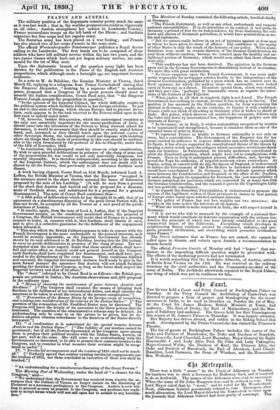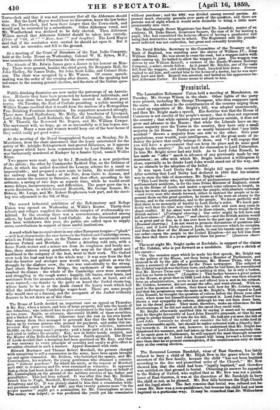Cht 30ttropolii.
There was a little " scene" in the Court of Aldermen on Tuesday. Its business was to elect a Governor for Holloway Gaol, and it resolved to do so forthwith. The names of the Aldermen were read in succession. When the name of Sir John Musgrove was read he refused to vote. The Lord Mayor ruled that he "must," and he voted for Mr. Weatherhead. Next, Alderman Gabriel persistently refused to vote. Thereupon, after much altercation, the Lord Mayor directed the Town-clerk to enter lc the journals that Alderman Gabriel had been guilty of contempt Town-clerk said that it was not necessary that all the Aldermen should vote. But the Lord Mayor would hear no discussion, knew the law better than the Town-clerk, had been there longer than the Town-clerk, and Would not be overruled by a subordinate. Other Aldermen voted, and Mr. Weatherhead was declared to be duly elected. Then Alderman Wilson moved that Alderman Gabriel should be taken into custody. (Cries of "Oh, oh !" "Hear, hear !" and laughter) The Lerch Mayor said that if the resolution were carried he should.act upon it. But it met with no seconder, and fell to the ground.
At a meeting of the Court of Directors of the East India Company, held at the India House on Wednesday, Colonel W. H. Sykes, M.P., was unanimously elected Chairman for the year ensuing.
The friends of Mr. Edwin James gave a dinner in his honour on Mon- day. There were present, besides the chief guest, Sir Benjamin Hall, Sir John Shelley, Sir -James Duke, Sir John Scott Lillie, and Colonel Dick- son. The chair was occupied by a Mr. Watson. Of course speech- making was the order of the evening after dinner, and the speaking had reference to the coming general election, and the state of the Italian ques- tion.
Public drinking fountains are now under the patronage of an Associa- tion. Hitherto they have been promoted by benevolent individuals, and in this way alone two hundred have been erected in different great towns. On Tuesday, the Earl of Carlisle presiding, a public meeting at Willis's Rooms resolved that it would form the nucleus of a Metropolitan Free Drinking Fountain Association. Its supporters mustered strongly. There were Lord Shaftesbury, Mr. Melly, the benefactor of Liverpool, Lord John Russell, Lord Radstock, the Earl of Albemarle, the Reverend A. W. Thorold, the Reverend Mr. Rogers, and Mr. William Cowper. The movement will, we hope, go on as successfully as it has begun aus- piciously. Many a man and woman would keep out of the beer-house if they could easily get good water.
At the meeting of the Royal Geographical Society on Monday, Sir R. Murchison, from the chair announced that the hopes entertained for the safety of Mr. Adolphe Sehlagintweit had,proved fallacious as it appears from papers which have been communicated by Lord Stanley, that he was barbarously murdered at Kashgar by- a fanatic Synd, named Welke Khan.
Two papers were read ; one by Sir S. Herschell on a new projection of the sphere ; the other by Commander Bedford Pim, on the Isthmus of Suez, in which the anther described the Lesseps scheme for a canal as impracticable ; and proposed a new route to India. He would continue the railway along the banks of the Nile, from Cairo to Assuan, and thence across the country to Berenice and thus effect, according to his eetimate, a saving of two days as regards time, while he would avoid many delays, inconveniences, and difficulties. The paper gave rise to a warm discussion, in which General Monteith, Mr. George Rennie, Mr. Sidney, Mr. Lange, and Mr. Robert Stephenson took part, and the meet- ing was adjourned to the 9th of May.
The second industrial exhibition of the Reformatory and Refuge 'Union was opened on Wednesday at Willis's Rooms. Thirty-four schools and refuges supplied the creditable samples of workmanship ex- hibited. In the evening there was a conversazione, attended among others, by Lord Radstock and Lord Carlisle. As the Government grant has been withdrawn this year, the public are called upon to supply -extra contributions in support of these useful institutions.
A vrord which has no equivalent in any other European tongue--"pluek" —will best characterize the race between the Oxford and Cambridge crews, which on Friday took place on the Thames over the accustomed course between Putney and Mortlake. Under a drizzling cold rain, with a fierce North-wester and a mimic sea from its roughness and heady mo- lion, these sixteen young gentlemen, who may sit for their spirit and hardihood in the company of the best, went to their work The Oxford crow took the lead and kept it the whole way : it was seen from the first that the heavier and stronger men would win, and gallant as was the struggle by the slighter crew, the race was undoubtedly to the strong. Just above Barnes Railway Bridge, the excitement of the spectators reached its climax : the whole of the Cambridge crew were swamped and struggling in the rough water; happily, life buoys, river boats, and assistance from the steamers attending the match, were at hand, and all were rescued,—no thanks to the party on board the Jackal steam-tug, whose haste to be in at the death caused the heavy wash which had filled the unfortunate Cambridge wager-boat. There are some people who would race at a funeral, and the occupants. of the Jackal evidently deserve to be set down as of this class.
The House of Lords decided an important case on appeal on Thursday A Mx. Kay, when a minor, and heir of large property, fell into the hands of one Johnstone, who induced him to give acceptances to the tune of 53,8001. in two years. Smith, an attorney, discounted 10,0001. of these securities, and a banker at Ware, 90001. Johnstone kept the rest in his own hands. But among them they managed to persuade Kay that the bills had been takes up by various persons who pressed for payment, and under this im- pression Kay gave security. Smith became Kay's solicitor, borrowed 30,0001. on the young man's property, paid a large part of it to Johnstone, and tried to enforce his security. Kay, now in better hands, resisted, and the Master of the Rolls decided in his favour. Smith appealed. The House of Lords decided that a deception had been practised on Mr. Kay, and that it was contrary to every principle of morality and equity to give effect to securities obtained in such a manner. Appeal dismissed with costs.
Edward Mortimer and Thomas Robert Marshall, the persons charged with conspiring to sell-a commission in the army, have been again brought up and again remanded. Mr. Bridson, who furnished the money, and Mr. Cunningham, his-nephew, the young gentleman who obtained a commis- sion "without purchase" for which his uncle, at the request of Marshall paid 400/. to Armstrong and Co. were examined as witnesses. It appeared tinitn claim ,hed -been made for a commission without purchase on behalf of Mr. Ciuminghans.ou the ground of the military services of his father and grandfather. This had been refused. It was after this that Mr. Bridson betook him to Pugh, Marshall, Mortimer, Colonel Steinbeek, Eicke, and Armetrong and Co. It was plainly stated to himthat a commission with- out purchase could be got for 400/.; nay that twenty guineas more "in the proper quarter" might get a nomination for Mr. Cunningham at once. Tha money was lodged ; as was predicted the youth got his commission without purchase ; and the 4001. was divided among several parties. At- present much obscurity prevails over parts of the question, and there are persons out of sight whom it would seem desirable to- bring a little more prominently into view.
The Marlborough Street Magistrate has fined Dr. Lonsdale, master of an academy, 18, Duke Street, Grosvenor Square, the sum of 5l. for beating a. pupil, who had committed the heinous offence of having a peashooter and using that destructive weapon-in school. The Magistrate said the punish- ment inflicted was not correction, but gross and cowardly brutality.
Mr. David Ritchie, Secretary to the Committee of the Treasury at the Bank of England, was standing near the statue of William IV., King William Street. Ho was about to cross the road, but a waggon-laden with- casks coming up, he halteffito allow the waggon to peso. The waggon wail, driven by one William Rezzell, a carman of the South-Western Railway Company, a sober, steady fellow. As it passed Mr. Ritchie, one of the casks fell from the waggon, and striking his head, Imockedlim down. Persons rushed to aid him, and carried him to the house of a doctor, but he was mor- tally hurt and died. Rezzell was arrested, and bailed on his appearance be- fore Alderman Carter. No blame seems to attach to him.



























 Previous page
Previous page